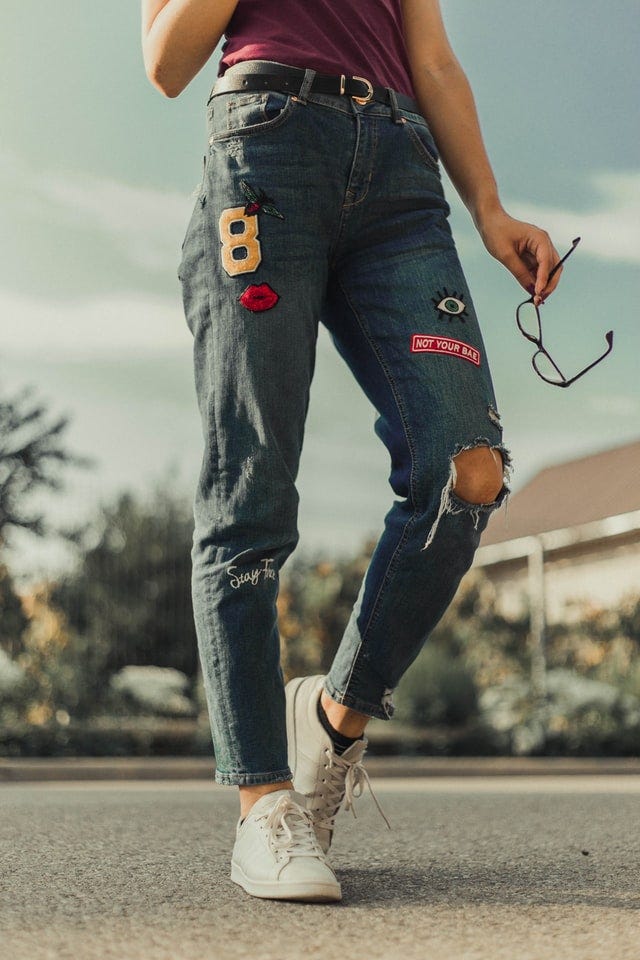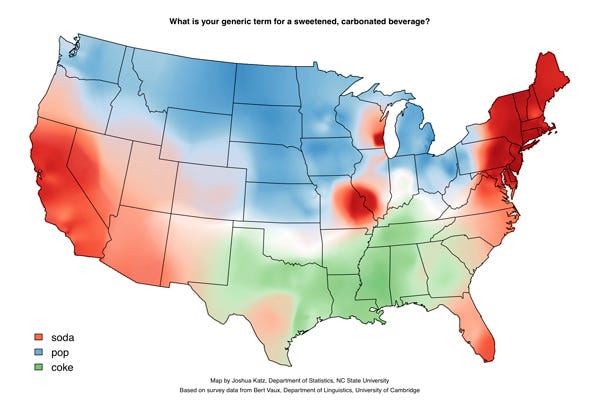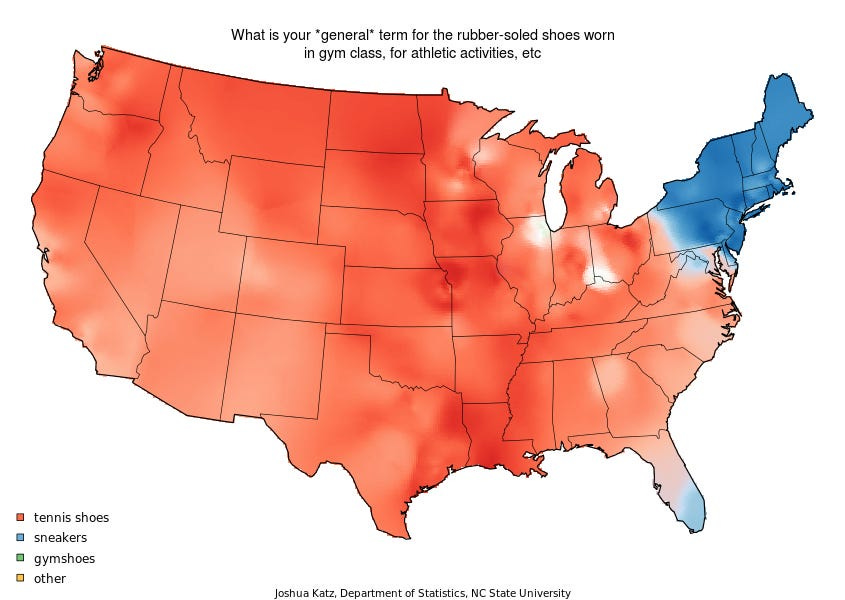Winning English - Mastering Idioms, Slang, and Cultural References
Sympathy for English learners • Where English speakers live might surprise you • Pants vs. trousers • Coke vs. soda vs. pop • Kitty corner vs. catty corner • Tennis shoes vs. sneakers
I often feel a lot of sympathy for English language learners. Learning a second language is already a hard thing to do, and it’s made even harder when there are many varieties of that language.
Interested in a podcast version of Winning English? Check out my site on Podbean or find it in your favorite listening app.
For example, there are many different forms of English. I often talk about American and British English, but there is also the English spoken in Australia, India, and many other places - including Nigeria, which I was shocked to find out has the second biggest number of English speakers in the world! Check out this chart from Wikipedia:
Also, note that the Philippines has more English speakers than the United Kingdom, which was also a surprise to me!
Of course, when it comes to varieties of English, I particularly like what’s called “Singlish” - that special mix of English and other languages spoken in Singapore, where I lived for six years.
Now, to be clear, all of these people can still understand one another. English is still English. But sometimes the differences can be confusing. And misunderstandings can happen, even between native speakers. Some of them are kind of funny. Let me give you one example.
Are you wearing pants? Are you wearing pants and trousers?
In the United States, we wear pants. A pair of pants is that article of clothing you wear to cover the lower half of your body.

However, in the United Kingdom, they wear trousers to cover the lower half of their bodies. They also wear pants, but “pants” are underwear, which are the clothes we wear to cover our “private parts”, if you can guess my meaning.
So I personally have had several funny moments with my British friends because of these words. Suppose I want to find out whether I need to wear “pants” to a party or whether it is okay to wear shorts - that is, pants that end above the knee. My friends can answer, “Well, we don’t care if you wear pants, but you must wear trousers!” 😆
Regional words and phrases in the United States
Of course, differences in English can happen within countries, as well as between them. For example, there are words and pronunciations that are used in some parts of the United States and not in others. These differences can indicate where a particular person grew up, and people often get very passionate about these differences, too!
One researcher - Joshua Katz from North Carolina State University - has researched these differences and generated maps of where they occur. Here are three examples:
We’re all familiar with the soft drink, Coca-Cola - which is often just called Coke. Oddly, in some parts of the US, “Coke” has become a general word for any kind of carbonated, sugary drink. (It’s in the green area above.) Other parts of the country call these drinks soda, though. And where I grew up in the state of Ohio, we always called these drinks pop. Later, by the way, I started using the word “soda” because I moved to Illinois, where that was more commonly used.
Here’s a second, somewhat odd example. When a house or other place is diagonally across a street from you - that is, it’s not straight across, but is at an angle - some parts of the US say it is kitty corner from you. Others say it is catty corner. This is strange, I know! But it’s what we do.
Finally, here’s a third example. There is a particular kind of soft-soled shoe that many of us wear. It’s often used for children’s physical education classes or by anybody for general comfort.

Most everyone in the US calls these shoes tennis shoes - which, as an avid tennis player myself, I like. But in the northeast of the US and in the southern part of the state of Florida, they are called sneakers - as if you are sneaking around in them to keep quiet.
Like I said, English can be hard, given the many different ways people use the language. But I wouldn’t worry about it too much. There is always a simpler, more common word that will work just fine. And really, in the end, it’s more important to communicate and to be understood than it is to be exactly correct. Sometimes it’s just fun to learn about these various quirks in the language.
Curious to find out more? Check out this article from Business Insider.
Also, check out this previous Winning English in which I cover the various ways people in the US say the plural of “you”.
Are you enjoying Winning English? I hope so! If you are, please consider donating to this service through Patreon. I count on support directly from readers like you. Thanks! 🙏🏻
What makes a person a “correct” English speaker, anyway?
As I mentioned above, it’s more important to be able to communicate and be understood in English than it is to be exactly right. And as I also mentioned above, there are so many different kinds of English that are spoken by native speakers, which one is exactly the right one, anyway?
Let’s make this discussion even more interesting. It turns out that there are far more English language learners than there are native speakers. By some estimates, there are twice as many non-native speakers of English as there are native speakers! So, whose English the right one?
This interesting question is explored in this podcast episode: “Tower Of Babble: Nonnative Speakers Navigate The World Of 'Good' And 'Bad' English”. I hope you enjoy it and take some comfort from it.
I also like the message this podcast has for native speakers. It encourages them to recognize how their use of idioms, unusual vocabulary, and cultural references can actually interfere with communication, even thought it’s perfectly correct English. In fact, that observation was one of the original inspirations for this newsletter!
Please tell a friend about Winning English
Thanks for being part of Winning English! If you like this service, please subscribe to this newsletter, subscribe to my YouTube channel, and as always, please tell a friend about it. I’m really looking to grow this project, and I need your help. Thanks again, and talk soon! 😄
Bill






